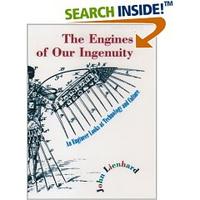Book Review
In lieu of actual content, I thought I'd tell you about yet another book I've just finished reading:
The Engines of Our Ingenuity by Dr. John Lienhard. Dr. Lienhard, professor of mechanical engineering at the University of Houston, is also the author and narrator of the nationally syndicated (NPR) radio program of the same name. The radio program is a roughly 5-minute monologue often about some obscure aspect of technology's impact on our lives, more or less through the historical perspective of technological evolution. The book's chapters are considerably longer, incorporating similar themes from several radio programs. In roughly the same vein as James Burke's series Connections (formerly on The Learning Channel, as well in book form), Engines discusses the art of invention behind the science required to make it happen. This is not a course in how to be creative, however. Readers without a scientific background will find the material easily accessible and uncomplicated. There is, unfortunately, something missing from the writing to draw the reader into that "can't put it down" state that I found with Burke's books.
<memorable passage>
The simple fact is that you and I create our own memorials. If wealth is our objective, then wealth is our memorial. If fame is our objective, fame may very well be all we get. But look around at the memorials of anonymous technologies that have made a better world- leaps of the mind that made the automobile differential, the pencil sharpener, the electric plug, the drop-leaf table, and the lawn sprinkler. I suppose we might find out who invented each of these things, but we are not likely to. Yet the inventions make finer memorials for the quixotic, mentally driven people who gave them to us than wealth or tombstones ever could.</memorable passage>
...
The situation is not much different in engineering and technology. Inventions burst forth when the world is ready to shift under our feet. We may designate this or that contributor as the titular inventor, but that is only a matter of convenience. Most of the people who give us new technologies have no memorial. Rather, we select arbitrary heroes and let them tell of the collective wisdom. We celebrate Edison, Bell, Morse, and Fulton not because they transcend you and me but because they encapsulate what you and I are capable of doing if we choose to. Those arbitrary heroes reflect what countless others (like us) have already done, over and over, to put us where we are.from Chapter 14

0 Comments:
Post a Comment
<< Home